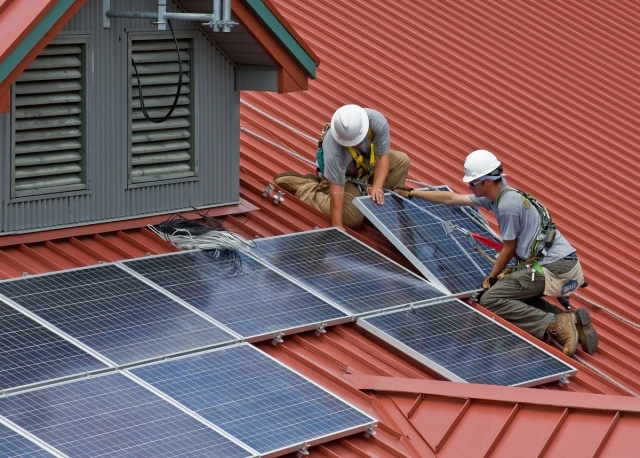This article has been re-posted from The Ecologist.
The UK government is to cut support for domestic rooftop solar to 13% of current levels, with similar cuts for bigger systems, and end all support for small scale renewables by 2019. The likely result, and surely the intention, is to kill off the UK‘s solar industry altogether, writes Oliver Tickell, editor of The Ecologist.
The Government yesterday set out its plan to cut subsidies for small scale solar PV in the UK – and it’s punitive.
In fact it’s so bad that it looks like a deliberate attempt to kill off the sector altogether, even though the government’s own polling shows that solar is Britain’s most popular energy source, with 83% support.
FIT Collapse
Just a few years ago, UK solar installations up to 4kW in capacity were eligible for 43p per kilowatt-hour (kWh) generated. That has since fallen to 12.47p, a rate available until December 2014.
But now the ‘feed-in tariff’ (FIT) support is set to collapse to just 1.63p per kWh. Slightly larger installations from 10-50kW will get the highest rate, 3.63p, down from 11.3p. And then it falls back to 1.03p for the largest installations of 1-5MW, down from 5.94p.
Rates are going to continually fall from these already low levels. Volumes of installation will be capped on a quaterly basis, And then the scheme will be terminated altogether by 2019.
Smaller scale wind and hydro face far less severe cuts. For example wind power rated at under 50kW will get 8.61p, down from 13.73. But bigger installations will get about half that, and above 1.5MW nothing at all. Hydro up to 500kW will get about 10p.
The plan comes in the form of a public consultation described as a “set of measures to control costs under the Feed-in Tariff, including revised tariffs based on updated technology cost data, a more stringent degression mechanism and deployment caps leading to the phased closure of the scheme in 2018 – 19.”
After her re-election as an MP last May energy secretary Amber Rudd promised: “I want to unleash a new solar revolution – we have a million people living under roofs with solar panels and that number needs to increase.”
Attacking Solar
Why is the Government pushing the solar industry off a cliff?
“The Conservative manifesto said nothing about attacking the British solar industry, which has flourished thanks to public support and delivered unprecedented cost cuts”, said Leonie Greene of the Solar Trade Association, which represents the UK‘s solar installers.
“Government should back that momentum, not push the industry over a cliff when it is so near to being able to repay public investment through lower and more stable bills in future – as well as tens of thousands of jobs. The British public knows solar is the future and are embracing this technology.”
The STA has engaged with officials and ministers to advise on how the FIT could be reformed to provide better value for money and achieve solar ‘grid parity’ with fossil energy around 2020, reflecting predictions that solar power, if adequately supported, will cost no more than gas-generated power within five years.
Self-Defeating Proposals
In June STA published its Solar Independence Plan for Britain which set out how £1.70 per year on household energy bills between now and 2020 would deliver a million more solar homes and grid parity.
“We don’t agree with these self-defeating proposals and will be urging DECC to take up our alternative”, said Mike Landy, STA Head of Policy. “A sudden cut combined with the threat of scheme closure is a particularly bad idea – it will create a huge boom and bust that is not only very damaging to solar businesses and jobs but does nothing to help budget constraints.
“We really are astonished at how self-defeating these proposals are. Instead, we are calling on the Government to work with the solar industry to deliver our plan for a stable glide path to subsidy-free solar.”
What is especially hard to understand about the proposals is that they offer so much lower rates for solar power than the other technologies covered by the FIT scheme, when the solar sector has been uniquely successful at cutting costs.
In effect the solar sector is being punished for its success, and the only conceivable reason for so doing is to protect the existing fossil fuel power generation industry and the ‘Big Six’ energy oligopoly from the competition that cheap solar power represents.
What About Climate?
Meanwhile, Friends of the Earth has raised the question of how this move – which it says “will essentially end support for rooftop solar energy” – squares with the UK‘s climate change targets, especially pertinent as the world prepares for the COP21 UN climate negotiations in Paris this December.
“From California to China, the world is reaping the benefits of a solar revolution, yet incredibly in the UK David Cameron is actually trying to shut rooftop solar down”, said FoE energy campaigner Alasdair Cameron.
“Policies like this will further undermine David Cameron’s credibility on climate change. World leaders meeting in Paris later this year will have every right to call him a hypocrite.
“Of course the feed-in tariff should fall as solar becomes cheaper, but the government clearly plans to remove support entirely. This is politically-motivated, and will take away power from people and hand it back to big energy firms.
“These absurd solar cuts will send UK energy policy massively in the wrong direction and prevent almost a million homes, schools and hospitals from plugging in to clean, renewable energy. Instead of championing fossil fuels, the Government should focus on developing the UK‘s huge renewable energy potential.”
Now the STA is initiating a campaign aimed at forcing the government to back down: “We have already written to the Prime Minister with 100 local authorities, community energy groups and professional associations in support of FITs. When Parliament returns we intend to grow this alliance and fight hard for a policy and a technology that gives power to the people.”
But the Government has a warning of its own, threatening the closure of the entire FIT scheme as soon as January 2016 if agreement is not reached:
“If such measures cannot put the scheme on an affordable and sustainable footing then there should be an end to generation tariffs for new applicants as soon as legislatively possible, which we would expect to be January 2016.”
Photo: Wayne National Forest via Flickr
Subscribe to our newsletter
Stay up to date with DeSmog news and alerts







